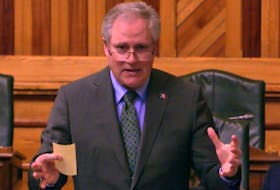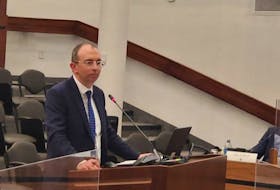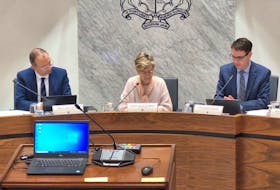It’s been almost one year since Finance Minister Tom Osborne announced a comprehensive review of the province’s tax system by an independent five-person committee.
The goal is to ensure the system is competitive and fair, identify ways to simplify the system, reduce costs for taxpayers and government, and determine how progressive the system is and if the right tax mix is being applied to taxpayers.
The committee’s report, due in November, is expected be informed by submissions from stakeholders and consultations with provincial and national organizations. One such group that recently had an audience with the committee was the Investment Industry Association of Canada, led by its president and CEO Ian Russell.
It commends government on being the first province to undertake a review of this magnitude at a time when work practices and demographics are changing and economic uncertainty is on the rise.
Related stories
Tax relief is N.L. finance minister’s hope, but not a given
N.L. government to kill the book tax
Russell says tax systems need to be re-evaluated in light of those factors because they become unwieldy and inefficient as they grow incrementally.
“It gets more and more like a ball of wax,” says Russell. “It starts to be a far less efficient and far less likely that it achieves the outcomes that were originally intended, which is really to provide a fair system that can encourage investment and savings and, at the same time, generate revenue.
“The whole system, anywhere you look, is really inefficient.”
The IIAC recommends the province maintain a broad tax base to allow for lower levels of taxation to achieve a revenue objective.
By doing so, it could simplify the system, improve fairness and efficiency, and mitigate potential revenue shortfalls in the event economic situations change.
The IIAC says government should take a look at whether it’s using tax expenditures, grants, and loans efficiently.
Russell points to the 2015 auditor general report that found that of 14 programs reviewed, 10 did not have performance measures in place to assess their goals and objectives, and that the programs were not regularly evaluated.
“If they can't demonstrate a strong case for leaving them in place, then do away with them,” he says. “Somebody should at least do the math and figure out how much it's costing the Newfoundland government to provide those things to business. I think the numbers would be pretty large.”
Another recommendation Russell suggested the committee include in its report is more reliance on consumption taxes like HST and less on income and profit taxes.
Doing so, he says, doesn’t create a disincentive to savings and investment.
“What you want to do is target the tax from an efficiency point of view, in terms of the fewer side-effects on consumption. Yes, it will discourage consumption but at the expense of leaving people with more savings. That's not a bad thing.”
Russell and company also made the recommendation that personal business taxes be decreased, suggesting it would attract investment from other parts of Canada and abroad and help retain skilled labour while also encouraging entrepreneurship. But the current fiscal situation facing the province made that an untenable suggestion for the committee.
Along the same lines, the IIAC told the committee it should propose a made-in-Newfoundland tax incentive to attract investment capital for new and expanding small- and medium-sized businesses and to alleviate some of the pressures stemming from the anticipated retirement of many small business owners.
Political priorities
“Let's face it, tax reviews and broadly based tax reform is important but it's not a high-priority item and Newfoundland’s got bigger problems around the deficit, spending,” says Russell. “That's the priority,”
As such, he’s concerned that the report — which likely won’t be given due consideration in the province’s House of Assembly until the spring of next year — won’t get acted upon before another change in government.
“Hopefully, there'll be some way or mechanism to try to keep it alive because there's a good probability… it will be tabled,” he said. “It'll be a good report, you'll get a change of government, it'll get shelved. Somewhere down the line someone will dust it off, then they're going to want update it or do another one.”
Russell says the report will need a champion to take up the cause and keep it front and centre once the report is filed.
But the report, he says, shouldn’t be constrained to the province’s borders. The IIAC suggests that the recommendations contained therein could apply just as well at the national level as they do at the provincial, but with double the impact for taxpayers and government.
“Engage with the House Finance Committee in Ottawa, which has actually called for a comprehensive review of the federal system, and they should provide some leadership to the federal government in terms of the importance of this exercise and in terms of some of the recommendations we've made.
“The provinces have more leverage and influence on the federal agenda than sometimes they think. They don't have the wealth and the income of the federal government or the mandate, but that aside they provide a lot of services to business, they understand small business very well because it's integral to the makeup of the province.”
Earlier this week, Finance Minister Tom Osborne told The Telegram he wouldn’t rule out some Budget 2019 containing some of the recommendations from the committee.
“It depends on what the recommendations are and how hard they are to incorporate. Without seeing them, it’s very difficult to comment on what we may or may not be able to do with the recommendations, but if there are things that are easily implemented in the budget for 2019, we’ll certainly look at those,” he said.
The entirety of the IIAC’s submission to the committee can be found here.
To learn more about the province’s tax review, click here.
Twitter: kennoliver79

![['<p>Ian Russell is the president and CEO of the Investment Industry Association of Canada.</p>']](https://saltwire.imgix.net/russell-3113574.jpg?cs=srgb&fit=crop&h=568&w=847&dpr=1&auto=enhance%2Ccompress%2Cformat)







